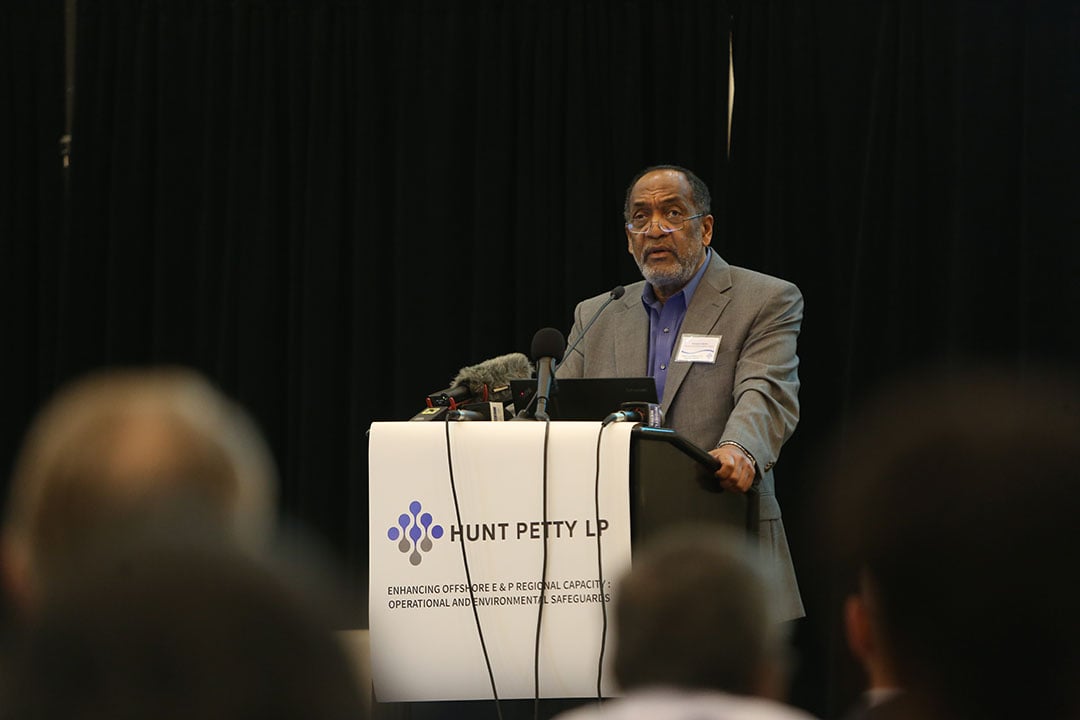Oil companies operating in Guyana should allow regulatory authorities “unfettered” access to their operations, Environmental Protection Agency (EPA) Executive Director Dr Vincent Adams has said.
“There should be no prevention or stiff-arming of government employees or people who provide oversight to go on that rig at any time,” Adams on Monday told an oil and gas conference on operational and environmental safeguards, where representatives from all operators here were in attendance.
He said that while his agency does not at the moment have the oversight capacity, he believes that government is committed to ensuring that they get the resources needed to execute their mandate and when local oversight bodies seek to fulfil their duties, they should not be barred because of any legal clauses.
“I am not going to stand here and lie to you and tell you that we are ready… but we should not be prevented from visiting the sites at any time, including unannounced visits,” Adams said.
Following his presentation at the conference, held at the Marriott Hotel in Georgetown, Stabroek News asked Adams how he will meet the objectives set out in the presentation and if he had the resources and finance to cover the building of a unit dedicated to oil and gas oversight while equipping the rest of the agency with the wherewithal to deal with the challenges faced. He was confident that he will get the resources. “I know that the Government of Guyana understands the critical importance of the EPA and the role it has to play to ensure safe and environmentally sure operations, and all indications have been very encouraging in terms of government support,” he said.
He added that he was optimistic that the agency will be allocated the adequate funding necessary to meet these goals, while noting that it is in the process of submitting proposals for the budget. “There is no question that the government and people will understand the critical nature of the agency and provide the necessary resources for its mandated responsibilities,” he said.
Government has come in for heavy criticism over a provision of its contract with ExxonMobil’s local subsidiary and its partners, which critics say appears to give the company time to put operations in order before a visit.
“The Minister, through duly appointed representatives, upon providing the contractor with at least seven (7) days’ notice, shall be entitled to observe the petroleum operations conducted by the contractor at his sole cost and expense and at all reasonable times to inspect all assets, records and data kept by the Contractor relating to such petroleum operations. In the exercise of such rights under this paragraph the Minister shall not unduly interfere with the Contractor’s petroleum operations under this agreement,” Article 9 (e), in the section ‘Records, Reports and Information; Confidentiality,’ states.
But government has said that if it believes or has evidence that there are illegalities in the operations of ExxonMobil and its partners offshore, it will make impromptu visits.
Nonetheless, Adams, like head of the Department of Energy Dr Mark Bynoe, who spoke before him, said that it was in the companies’ best interest to operate safely.
“We have to trust also the operators and I guarantee the operators do not want for anything to happen. They know that if anything happens, their operations are going to be shut down and it’s also not good for the economics of the company, and also the branding of the company. So you trust and you still have to verify. And in the permits that we have been issuing for the offshore operations, I think we are very, very confident that the system we have in place and the regulations that we are imposing and the standards that we impose, we are pretty confident that they will operate safely,” he said.
‘Environmental goals’
Bynoe said that combatting environmental issues through foreign and domestic legislation has been met with limited success in many jurisdictions, but tends to be most successful where environmental risks are explicitly embedded in daily operations.
“Approaching decisions regarding environmental risks in the same fashion as any other risk incurred by the company serves multiple purposes. Making environmental goals part of the business plan as opposed to a secondary task helps align the internal values and actions of company employees with the external views of the corporation as a whole. There is significant advantage in placing emphasis on preventative measures instead of alleviation methods,” he said.
Bynoe said that over the years it has been seen that while international frameworks, declarations, and treaties have been developed to combat the challenges associated with protecting the environment, they have not proven to be effective at compelling large oil and gas companies to manage their environmental impacts.
Similarly, traditional strategies of implementing national policies tend to lack the ability to eliminate incidents caused by energy exploration and production.
He, however, noted that “as global energy requirements escalate, so does the demand for improved environmental efforts. Oil and gas companies are thus faced with the pressure to deliver both high returns to their shareholders while still producing social good.”










